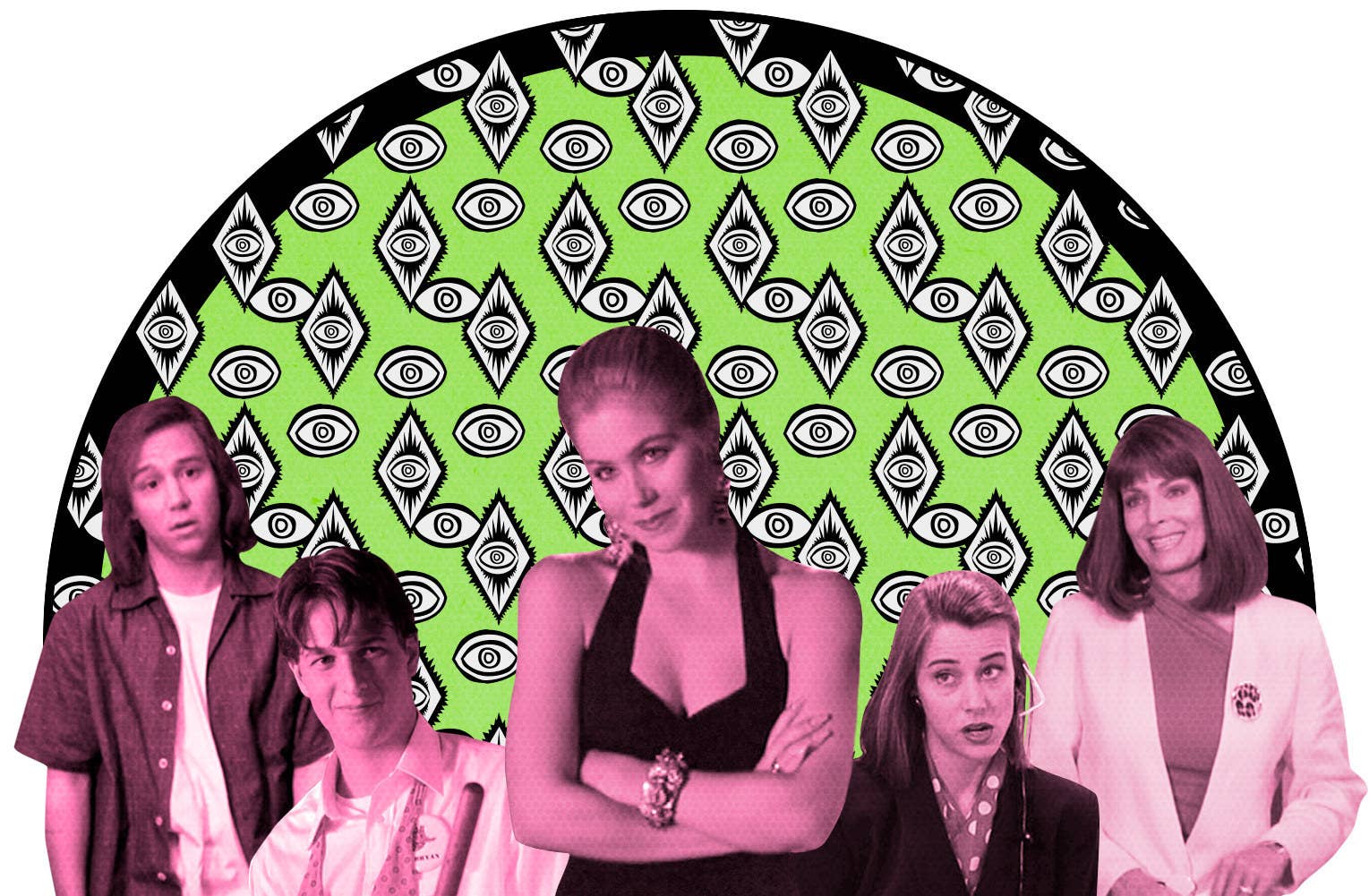
Christina Applegate has been a successful working actor in Hollywood for more than 40 years. She was first catapulted into the spotlight in 1987 with her breakout role on Married With Children, a long-running, groundbreaking comedy series that helped cement Fox as a network worth paying attention to. In the years since, she has starred in dozens of films, headlined three more television shows, and was nominated for a Tony award, three Golden Globes, and four Emmys (one of which she won in 2003 for Outstanding Guest Actress in a Comedy on Friends).
But with all those accolades and beloved performances to her name, nothing quite compares to Don't Tell Mom the Babysitter's Dead. "People come up to me and say, ‘Of all the things you've done, Don’t Tell Mom is my favorite,’" Applegate told BuzzFeed News during a recent phone interview. "Its popularity is the most shocking to me of anything I've done.”
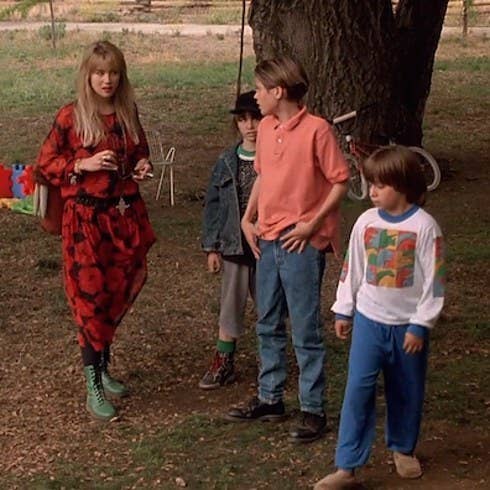
Much of her disbelief stems from the initial response to the 1991 mid-budget, black comedy, in which Applegate starred as Sue Ellen “Swell” Crandell, a recent high school graduate who pretends to be a twentysomething in order to get a job after the elderly babysitter caring for her and her four younger siblings dies while their mother is on vacation. Don’t Tell Mom flopped at the box office, opening in sixth place and garnering some truly scathing reviews: Gene Siskel voted it one of the year’s worst movies, Entertainment Weekly gave it a D+, and the Washington Post’s Hal Hinson wrote that it was “the kind of movie that makes you wish you could sneak into the projection booth with a pair of pinking shears. To say that it's dead isn't really fair; nothing that's dead could be this obnoxious.”
But unlike so many other critically panned, financially underwhelming films, Don’t Tell Mom the Babysitter’s Dead — which mixed elements of Risky Business, Home Alone, Working Girl, and The Secret of My Success — would not die. Instead, it found a much more receptive audience through VHS rentals and seemingly endless HBO airings.
In the 24 years since its release, the oft-quoted film — “Right on top of that, Rose”; “The dishes are done, man”; “Thank you Katrina. Thank. You. Katrina” — has achieved full-fledged cult status and become one of the most beloved comedies of a generation.
It’s particularly a feat for those who helped bring the movie to the screen, especially since there was a time when it looked like Don’t Tell Mom might not get made at all.
Writers Neil Landau and Tara Ison first came up with the idea for Don’t Tell Mom the Babysitter’s Dead in the mid-‘80s. “I always loved Risky Business and the original inspiration was: What if the parents went out of town and instead of the kids destroying everything, they got their shit together? If anybody underestimated them, what if they actually were able to function in the adult world because they were forced to — and what would the ramifications of that be?” Landau told BuzzFeed News during a recent phone interview.
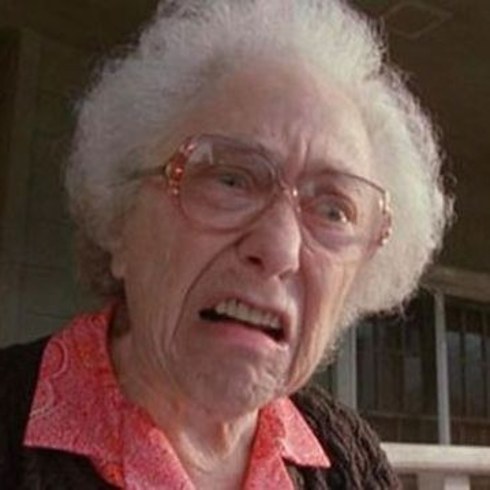
The idea percolated for a little while before Landau and Ison, whom we were unable to contact for this story, completed a first draft of the script in 1987. At that time, the movie was called The Real World (five years before that title belonged to another project) — and the screenwriters envisioned an actor like Winona Ryder in the starring role. The dark, twisted script became the subject of a bidding war, with multiple studios looking to produce the story of a young girl thriving in corporate America. In the end, The Real World ended up at 20th Century Fox and was set to star Justine Bateman, hot off Family Ties. But when she wound up leaving the project for undisclosed reasons, the script sat on a shelf for a while.
Before it was put away though, The Real World had already been through some of the rewriting process and Landau and Ison weren’t exactly thrilled with the results. “The original idea from the original script was that the babysitter was a nice old lady and she just dropped dead,” Landau said. “But everybody, except for us, felt that, for the teen audience, the babysitter had to be really mean because if she was a nice lady, it would be sad. So the mean babysitter who blows a whistle and barks commands, which is sort of funny, that was something we were forced to do and didn't like.”
Fox also asked that the screenwriters up the number of Sue Ellen’s siblings from two to four, cut an entire subplot in which Sue Ellen accidentally kills Rose Lindsey’s (Joanna Cassidy) cat, make Sue Ellen smarter with how she hides the missing petty cash, and build out Sue Ellen’s work world.
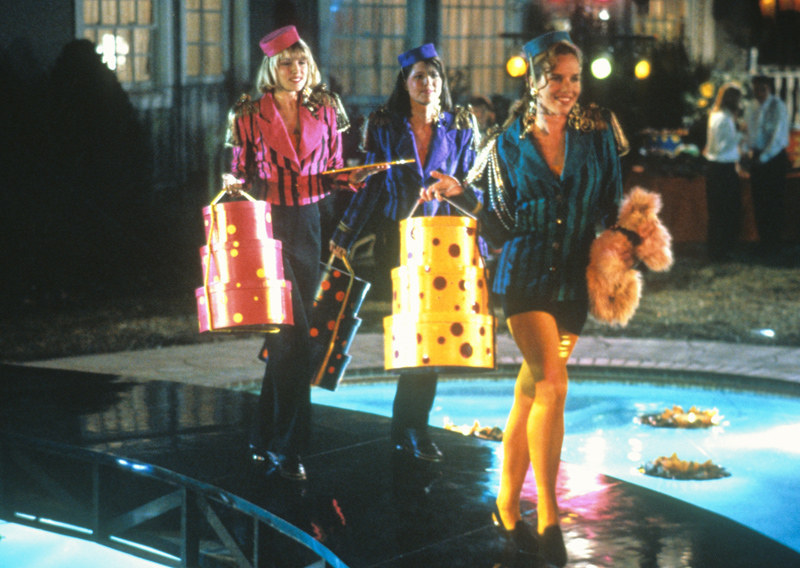
“The whole point was we had no idea what the company did, but more importantly, Sue Ellen had no idea what the company did,” said Landau. “Fox thought it was important we specify what the company is. First it was a vitamin company, then it was a book company — drafts after drafts of different companies.” Eventually the nondescript workplace became General Apparel West, a company that manufactured sports uniforms (which play a major role in the film’s iconic denouement).
The project lay dormant until 1989, when an executive at Outlaw Productions — which had just produced Steven Soderbergh’s iconic independent film Sex, Lies, and Videotape — discovered the script and fell in love with it… for the most part. “They thought the script needed some work but wanted to produce it,” Landau recalled of what resulted in another rewrite.
But given the many changes that had already been made to the screenplay at Fox, Outlaw suggested only a few tweaks — including an important one that brought the film’s two worlds together. “In the original script, Bryan (Josh Charles) wasn’t Carolyn’s (Jayne Brook) brother,” Landau revealed of Sue Ellen’s love interest and workplace nemesis, respectively. “They wanted there to be higher jeopardy at the office.”
With the script in solid shape and with Bateman long gone, it became time to find the movie’s most crucial element: Sue Ellen.
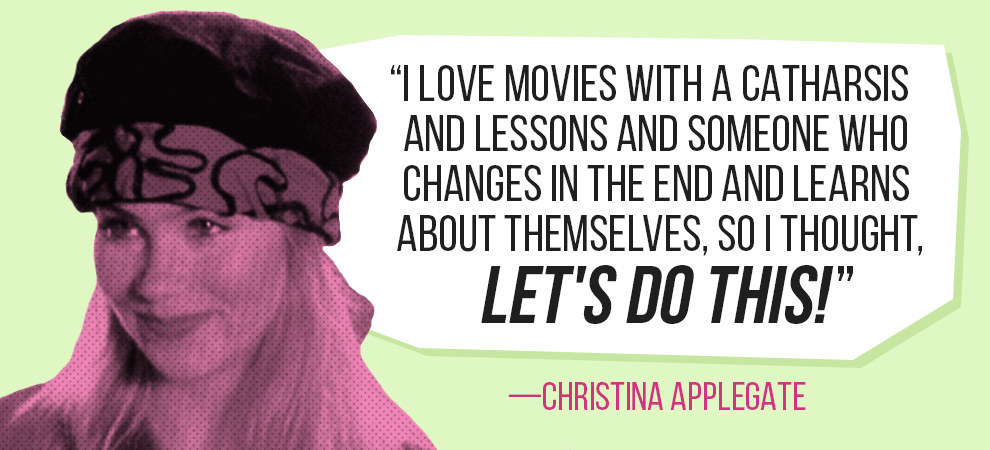
And they discovered her on Married With Children. “One of the producers at Outlaw was very friendly with Ed O'Neil,” Landau recalled of the actor who played Applegate’s character’s father on the hit Fox series. “He said, ‘I can get the script to Christina Applegate,’ who we heard was interested.” So, the producer went to a taping of Married With Children, O’Neil handed the script to Applegate, and the rest fell into place.
“I liked the idea of this teenager having to parent her siblings,” Applegate said. “I love movies with a catharsis and lessons and someone who changes in the end and learns about themselves, so I thought, Let's do this!”
With a star on board, Outlaw looked to HBO — which was actively producing theatrical films at the time — for funding. The premium cable company agreed to finance the movie, which, unbeknownst to everyone involved, would become an essential component to the film’s eventual success.
And Stephen Herek, who had just finished Bill & Ted’s Excellent Adventure was hired to direct, much to Landau’s consternation. “We liked him personally, but were worried the movie would get dumbed down or too silly,” he said of his and Ison’s concerns of the director, who declined to be interviewed for this story. “In our highfalutin perception of the script, we wanted to do something more like Working Girl and have it be a smart teen comedy. But we were also told that with Stephen Herek attached to direct and Christina Applegate starring, we would have a green light. So we decided to get the movie made!”
The next order of business was to fill out the cast, so producers turned to Sharon Bialy, who had previously helped cast Blue Velvet, Child’s Play, Say Anything, and Drugstore Cowboy.
“You have to go off your instinct and belief in an actor; that they have a quality that's so special for that role that they elevate the material, if and when needed,” Bialy told BuzzFeed News of her approach. For example: “I remember fighting for David Duchovny,” she said of the actor who would go on to play Bruce, Carolyn’s boyfriend/righthand man in attempting to expose Sue Ellen’s real age — and eventually, of course, Fox Mulder on The X-Files. “He'd done nothing! I remember somebody said to me he didn’t feel like a smart guy and I remember saying, ‘He went to Harvard!’” [Editor's note: Duchovny actually went to Princeton for his undergraduate degree, and Yale for his Master's degree.]
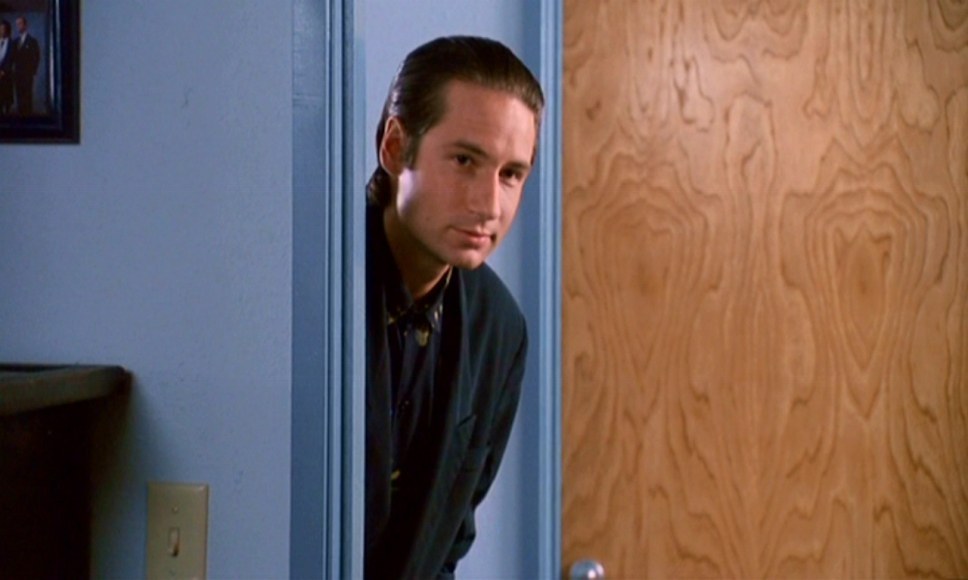
For Duchovny, the film was memorable for two reasons: “It was maybe the first or second job I got here when I moved out to Los Angeles,” he told BuzzFeed News. “And I remember I had this really bad hairdo.”
Bialy also had a feeling about Josh Charles, who was coming off a dramatic turn in Dead Poet's Society, his second-ever on-screen role. “I love to take actors who are known in one genre and put them in another,” Bialy said of targeting him to play Bryan. “I think this town pigeonholes actors all the time. One of the creative things you can do as a casting director is, when you know something else about that actor, is take that quality and really exploit it.” (Charles, who recently starred on The Good Wife, was unavailable to be interviewed for this story.)
Then, at Landau’s suggestion, Joanna Cassidy, who had previously appeared in Blade Runner and Who Framed Roger Rabbit, was tapped to play Rose Lindsey — Sue Ellen’s passionate and slightly unhinged boss at General Apparel West. “I just read the script and thought it was funny. I could visualize it, I could see this boss,” Cassidy, who now stars on Bravo’s Odd Mom Out, told BuzzFeed News. “She was a woman that fell in love with everything. She fell in love with her people, she fell in love with the fabric, she fell in love with everything. That is just the kind of woman she was. It was all gorgeous, it was all beautiful, and she wanted it all to work. She really did. … Unless I'm doing really, really serious things, I don't ever want to go to the hard side of something. Because I feel that what's very important is you have to love these characters; as wicked as they are, there's gotta be something that makes them lovable.”
Next on Bialy’s to-do list was the role of Kenny, Sue Ellen’s younger brother who transforms from pot-smoking slacker to responsible burgeoning chef over the course of the film. Keith Coogan, who had already starred on dozens of television shows, came in to audition — but not for the role he was truly interested in.
“I asked who was playing the 15-year-old brother and was told I was too old,” Coogan, who was 20 at the time, told BuzzFeed News. “So I was reading for the Josh Charles role, but had just played the brother in love with the babysitter [in 1987’s Adventures in Babysitting], so I was like, Let's change it up.”
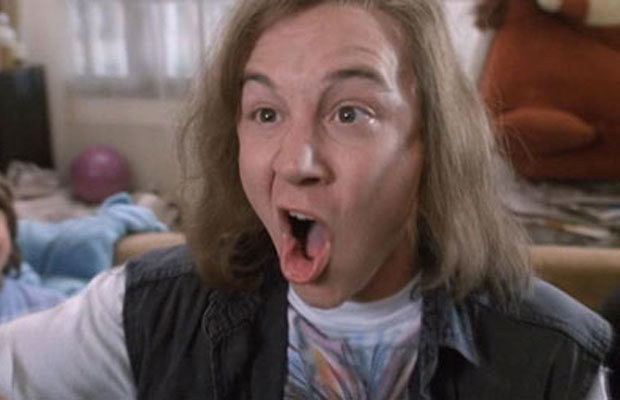
In a twist of fate, Coogan discovered an unexpected familiarity with the role of Kenny. “The timing was weird because a friend of mine and I had been messing around with a video camera, filming this little cooking sketch we had about two stoners who could barely get through grilled cheese sandwiches,” he said. “It was like I had been working on the character before I even knew it existed. We had taped the first one two weeks before the first audition for the movie, so I had the torn jeans, a skull vest, $15 wigs — they were terrible looking. Maybe that's why I was drawn to him.”
After his audition for Bryan, which, to his recollection, did not go well, Coogan went to his car, put on the stoner costume, and barged back into the audition room. “I kicked the door open and was like (affects stoner voice), ‘All right, who's in charge here?’ I was just Kenny. The producers were like, ‘Yeah, you got this.’”
The Crandell family was rounded out with Concetta Tomei as the absentee mother, Robert Gorman as the TV-obsessed youngest sibling Walter, Christopher Pettiet as the lovelorn middle child Zach, and Jennifer Love Hewitt as tomboy Melissa.
“We cast Jennifer Love Hewitt and [Kids Incorporated] wouldn't let her out to do the movie, so I quickly brought people in,” Bialy said. One of those last-minute potential Melissas was Danielle Harris, a young actor who had made a name for herself playing Jamie Lloyd in Halloween 4: The Return of Michael Myers and Halloween 5.
The New York-based Harris had just landed in Los Angeles the day before to audition for other projects when the opportunity to read for Melissa presented itself. “Back in the day, all of us kid actors would come out with our moms for pilot season — when pilot season was a short amount of time; now it's all the time,” she recalled. “The day after I arrived I met with an agent to represent me in California and she was like, ‘I love you, I want to sign you and — actually — I've got something I think you would be really right for, so we should see if we can get you in today?’ I was like, ‘I already have an audition?’ It ended up being for Don't Tell Mom. I swooped in, went on tape, and ended up getting the job that day.”
With the cast locked in, production began in and around Los Angeles during the summer of 1990 and it soon became clear to everyone on set just how much of a star Applegate was going to be.
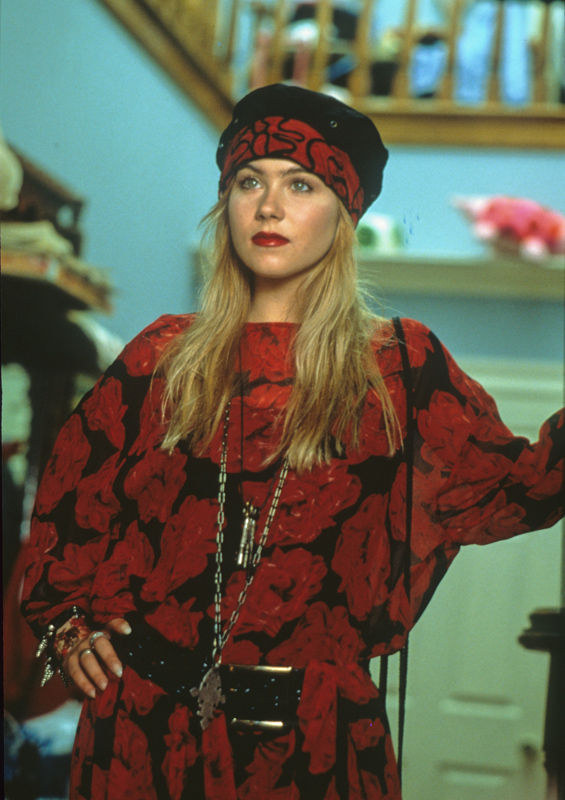
Coogan — who was friendly with Applegate because they ran in similar young Hollywood actor circles — found himself continually impressed by the level of dedication she brought to the role. “I don’t want to denigrate anything anybody else did, but that is her movie from top to bottom, beginning to end,” he said. “She nailed every single set-up and made it all work. Even when the movie doesn't work, she makes it work. She worked 16 hours a day, six days a week, for two and a half months.”
The rest of the cast had similar things to say about Applegate, who was only 18 years old at the time. “Christina Applegate was really a good star on the set, really kind,” Duchovny said, and Cassidy was also captivated by “darling little Christina,” for whom Don’t Tell Mom was her first lead film role. “We're all watching over her, clicking over her like mother hens, 'Are you OK, honey? You OK?’ And I'm taking her under my wing,” Cassidy remembered. “When we did the M&M scene, she didn't know what to do, she didn't know what to make of it, she didn't know what to make of me. I started throwing M&Ms at her to have her lighten up a little bit. It was just hilarious; she did not know what to do. But she was brilliant, brilliant in it.”
Although Applegate was nervous, considering Don’t Tell Mom was also the biggest-budget production she’d ever been involved with, she didn’t want to show it. “The way I like to operate is to always be professional, period,” she said. “It's not that I'm trying to act professional, it's that I really do believe that you don't show up late to things. That's just rude and it ruins everybody else's operation. There are set PAs who've been there for hours before you even get there at four o'clock in the morning. Don't complain and don't be late. That's just respect. Each and every person is such an integral part of what you're doing. … Nobody's job is less important than anyone else's because you take one piece out of that puzzle and the whole thing collapses. For me, it's about always being kind and loving. It's much nicer to be happy and have a loving set than it is to have some dick running it. And I've been there too and it's very uncomfortable.”
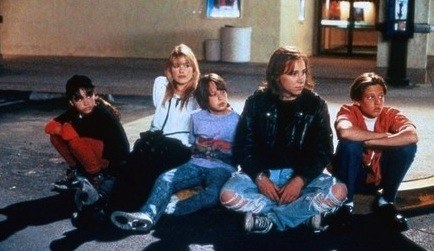
Establishing that familial tone also turned the five young actors playing the Crandell children into a tightknit brood — both on-set and off. “We all became like siblings,” Harris remembered. “We played together and hung out together. Christina, I just wanted to be her … I looked up to her and loved her clothes. We connected as the only girls on set with a bunch of boys. Keith's Keith — he's great and fun and friendly and open, very similiar-ish to his character at times. Robert and I became really good friends. We'd go paintballing together and he and his mom would stay at our house all the time. And I had the biggest crush on Christopher. I would do anything to be with him, to kiss him, but he was in love with Christina, so it was really hard. I remember when we wrapped, I gave Christopher a surfing book as a present and wrote something sappy inside, like, ‘You'll call me when I'm 18’ or something ridiculous like that.”
Though it wasn’t on her 18th birthday, Pettiet and Harris did reconnect, sadly just before he died from an accidental drug overdose in 2000. “We ended up going out on a couple of dates right before he passed away when we were in our twenties,” she said. “I randomly ran into him and we reconnected and I was like, ‘Oh my god, I can't believe this is happening.’”
Pettiet’s death certainly makes it hard for some of the Don’t Tell Mom cast and crew to look back on the experience, including Applegate. “I was really close with Christopher, which is really sad for me every time I think about that,” she said, growing quiet. “He was a really special, special young man. Dark and twisty inside, which I gravitate towards. I loved him. I really did. It's the saddest thing that could ever happen. God rest his soul.”
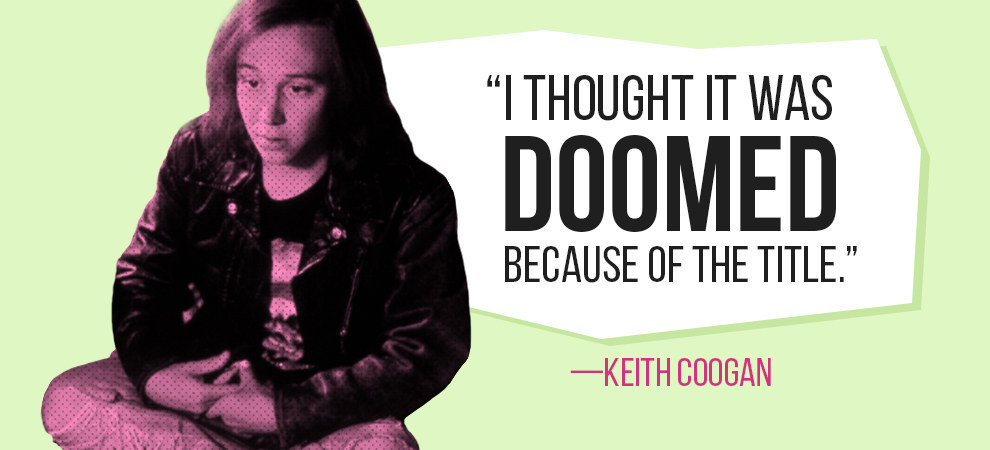
When production on the film — then still titled The Real World — wrapped in the fall of 1990, the now-iconic MTV reality series of the same name was about to debut, forcing the film to find a new title. The studio hired several marketing companies and after several focus groups, they landed on: Don’t Tell Mom the Babysitter’s Dead.
“We hated it! We were so embarrassed,” Landau said, calling the title “our worst fear — that it would become this stupid movie.” Some of the stars, like Coogan, shared Landau’s concerns. “Thirteen-year-old boys came up with that title,” the actor said, dismissively. “Like, really? It is so long and has so many apostrophes and possessive things — I thought it was doomed because of the title.”
Landau’s fears were then amplified when the film’s poster featured Applegate looming over the legs of an old lady sticking out of the ground, playing up the tone he worked so hard to avoid. And the screenwriter remained vehemently opposed to it until a comedy legend revealed that there might be something instantly memorable about the long, confusing title.
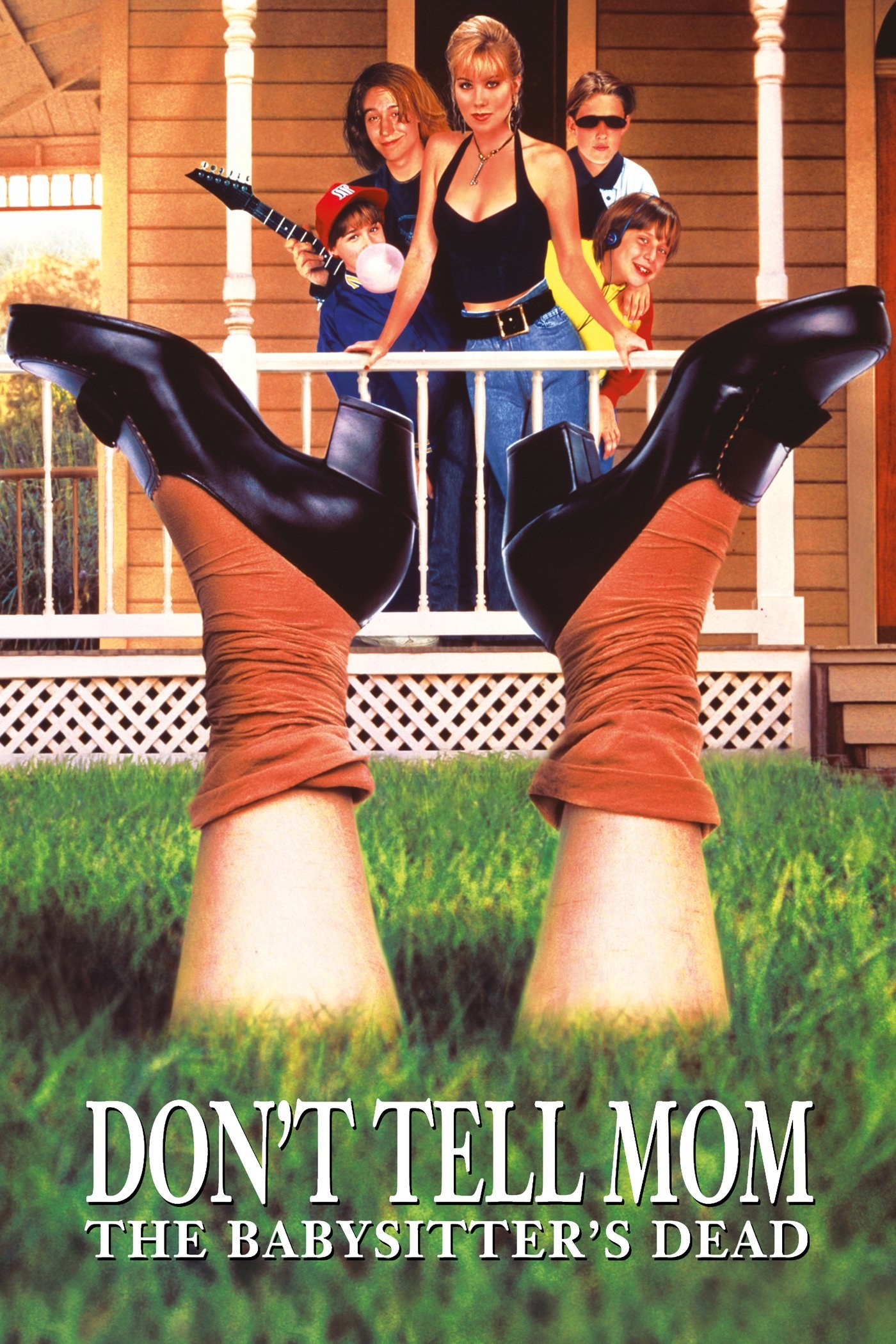
“One night I was watching The Tonight Show Starring Johnny Carson and he made a joke where the punchline was 'Don't Tell Mom something-something is Dead,'” Landau said. “He did a riff on our movie title and I can promise you — I can almost guarantee you — without that title, nobody would remember the movie. I really think it's part of what elevated it into cult status. It's such a provocative title. Sometimes writers think we know best, but in this instance, I think it was a smart choice to change the title.”
Along with City Slickers and Jungle Fever, Don’t Tell Mom the Babysitter’s Dead was released June 7, 1991, and earned a disappointing $4 million on its opening weekend. “We had very high expectations because the test screenings all went well,” Landau said. “Everybody thought we would have a huge hit on our hands and then it opened and it did so-so. It made money just because it was cheap.”
Getting universally panned by critics added insult to injury for the first-time screenwriters. “To have that public humiliation … we were very disappointed,” Landau said. “I think if we had zero expectations, it would have been fine, but we were really pumped up. They were talking about doing sequels and that we created a franchise — we were going to do Don't Tell Mom We Lost Water and things like that.”
While the younger actors were unaware of the film’s reception at the time, Cassidy remembered being flummoxed by its failure. “We didn't get great reviews and I couldn't figure out why not,” she said. “It was adorable. This move should have been huge.”
Then she cracked a coy smile, and added, “And now it is!”
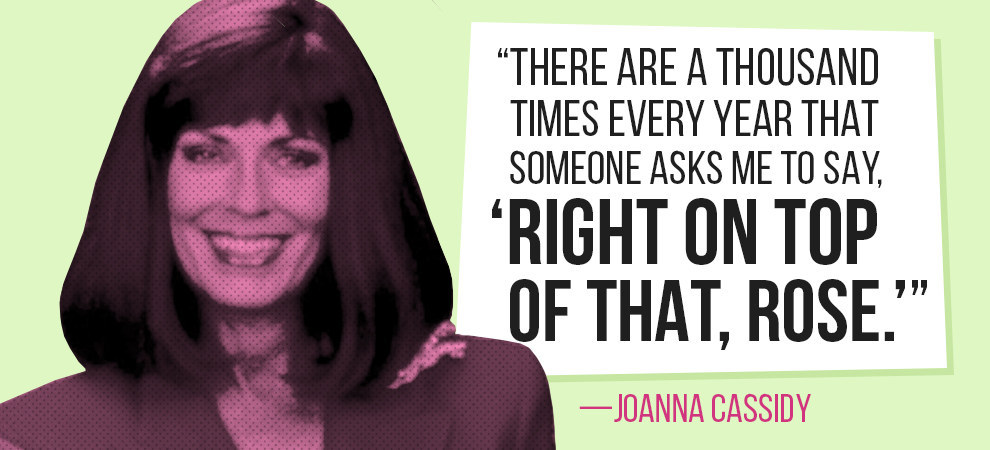
It’s impossible to ever know for certain what transforms a movie into a cult classic. From Rocky Horror Picture Show to Clue, there’s no commonality between all the films to earn this distinction. But those involved with Don’t Tell Mom have plenty of theories as to why it’s become one of the rare movies to grow in popularity over the years.
For some, the film’s enduring appeal is that it’s naively aspirational. “It was like every kid's dream to have their mom go away and have the entire summer without parents or babysitters and be an adult for a minute,” Harris said. “And that's the moral of the story: Every kid thinks they want to be grown up, but when they are grown up, all they want is to be a kid. Why was I rushing to be a grown up for so long? I should have just stayed a kid and rode dirt bikes and not given a shit. I don't think there had really been another movie like this — there really wasn't anything that touched upon what I think that age group feels at that time.”
For others, Don’t Tell Mom continues to resonate because of the idea that anyone can turn things around. “I think people could really relate to Sue Ellen,” Applegate said. “She was kind of pissed off, she was not doing great in school, not participating in her family so much; she was relatable to a lot of teenagers who feel like the burden of the world is on them. They're so dramatic about everything and I think in her success, there's hope. When I've seen it now as an adult, that's what I see: It's a feel-good movie. Everyone gets a second chance, everyone gets the chance to turn themselves around and all kids want to feel that way. They don't want to feel stuck in what they are. These characters give kids hope and I think that's thematically what you walk away from it believing and sensing and seeing.”
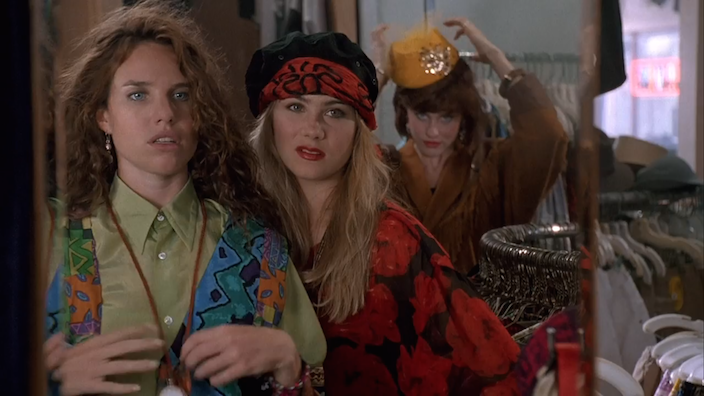
But in terms of cementing its popularity in a practical sense, everyone involved with Don’t Tell Mom agrees that it comes down to that early partnership with HBO. “We never allowed people to become nostalgic for it because it never stopped playing on HBO,” Coogan said of the movie entering heavy rotation on the pay cable channel, which had a vested interest in its success given that it initially financed the film. “I think replaying it always on cable is what really kept it going.”
And then, there was the VHS release. “They spent a million bucks on these huge cardboard cutouts of the babysitter's feet,” Coogan added of omnipresent in-store displays. “The movie exploded on VHS,” Landau added. “It was hugely popular and we felt vindicated a little bit.”
But, as Cassidy stressed, it wouldn’t have done so if it hadn’t been able to connect with multiple generations. “Yes, the repetition starts to set it in people's minds, and that has been wonderful, but you also have to consider that a movie has to be likable in order for that to happen,” she said, noting that she’s spent the last 24 years being reminded of that fact almost daily.
“Oh my god, there are a thousand times every year that someone asks me to say, ‘Right on top of that, Rose,’” Cassidy said of the film’s most quoted line. “I was shooting a movie in Turks and Caicos about 10 years ago and this little girl comes running over to me and says, ‘Oh my god! I'm ... I'm ... I'm ... right on top of that, Rose. She was hysterical. I was in Spain and this little girl did the same thing. Even when I have blonde hair, like I do now. Someone just came up to me the other day and said, ‘Are you Rose?’ It's the most amazing thing.”
Landau, who wrote the line for Sue Ellen, put it into the script in the most unassuming way. “I worked in a lot of offices and was around a lot of corporate culture and if anybody ever asked you something, no matter what, you always said, ‘I'm right on top of that,’” he explained. “It was something my boss had said when clients are in the office.”
But it’s since become something much larger. “I met some people who used to work on Sex and the City and they said that line was constantly used in the production office,” Landau noted. “Betsey Johnson tweeted, ‘Right on top of that, Rose,’ and [tagged] me in it,” Applegate added. “That's impressive. I have to say.”
And, like Friday’s “Bye, Felisha” after it, the quote has become popular to those who don’t even know its origins. “When we start assistants off and they're in their twenties, they'll actually go, ‘I'm right on top of that, Rose!’” Bialy said. “And it's like, ‘How do you know that?!? You were 12 when that came out!’”
Whether Don’t Tell Mom the Babysitter’s Dead eventually clicked because of its snappy one-liners, indelible performances, inescapable cable airings, or a combination of all of those elements, Landau's frustrations over rewrites, re-titles, and reviews have long been eclipsed by a sense of pride.
“I was at a Christmas party and a big, big producer was introducing me to someone as the guy who wrote Don't Tell Mom. I was a little bit embarrassed that he wasn't saying I wrote something where I would be kind of proud,” Landau recalled. “The guy's reaction was so over-the-top that I thought he was teasing me. ‘Oh my god! You wrote that?!?!’ This crowd formed around me who were just in awe of the fact I wrote that movie, which was, honestly, pretty hilarious. It's still weird. It's like somebody put a magic spell on America and they were somehow forced to love this movie.”

